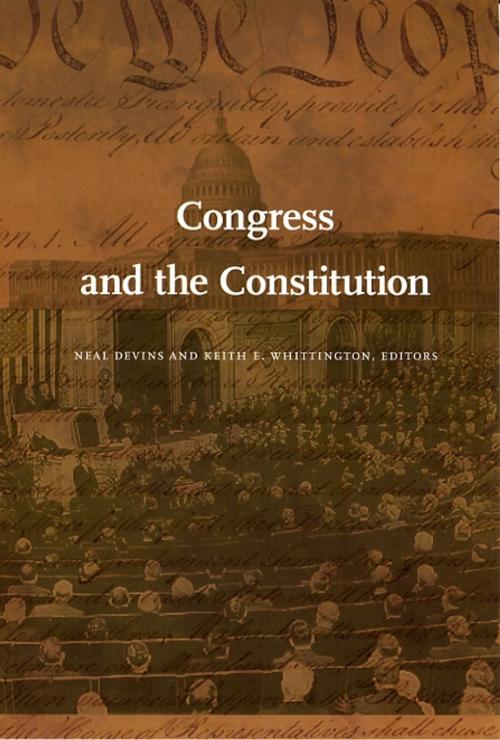Congress and the Constitution
Nonfiction, Reference & Language, Law, Constitutional, Social & Cultural Studies, Political Science, Government| Author: | Mark A. Graber | ISBN: | 9780822387114 |
| Publisher: | Duke University Press | Publication: | July 18, 2005 |
| Imprint: | Duke University Press Books | Language: | English |
| Author: | Mark A. Graber |
| ISBN: | 9780822387114 |
| Publisher: | Duke University Press |
| Publication: | July 18, 2005 |
| Imprint: | Duke University Press Books |
| Language: | English |
For more than a decade, the U.S. Supreme Court has turned a skeptical eye toward Congress. Distrustful of Congress’s capacity to respect constitutional boundaries, the Court has recently overturned federal legislation at a historically unprecedented rate. This intensified judicial scrutiny highlights the need for increased attention to how Congress approaches constitutional issues. In this important collection, leading scholars in law and political science examine the role of Congress in constitutional interpretation, demonstrating how to better integrate the legislative branch into understandings of constitutional practice.
Several contributors offer wide-ranging accounts of the workings of Congress. They look at lawmakers’ attitudes toward Congress’s role as a constitutional interpreter, the offices within Congress that help lawmakers learn about constitutional issues, Congress’s willingness to use its confirmation power to shape constitutional decisions by both the executive and the courts, and the frequency with which congressional committees take constitutional questions into account. Other contributors address congressional deliberation, paying particular attention to whether Congress’s constitutional interpretations are sound. Still others examine how Congress and the courts should respond to one another’s decisions, suggesting how the courts should evaluate Congress’s work and considering how lawmakers respond to Court decisions that strike down federal legislation. While some essayists are inclined to evaluate Congress’s constitutional interpretation positively, others argue that it could be improved and suggest institutional and procedural reforms toward that end. Whatever their conclusions, all of the essays underscore the pervasive and crucial role that Congress plays in shaping the meaning of the Constitution.
Contributors. David P. Currie, Neal Devins, William N. Eskridge Jr.. John Ferejohn, Louis Fisher, Elizabeth Garrett, Michael J. Gerhardt, Michael J. Klarman, Bruce G. Peabody, J. Mitchell Pickerill, Barbara Sinclair, Mark Tushnet, Adrian Vermeule, Keith E. Whittington, John C. Yoo
For more than a decade, the U.S. Supreme Court has turned a skeptical eye toward Congress. Distrustful of Congress’s capacity to respect constitutional boundaries, the Court has recently overturned federal legislation at a historically unprecedented rate. This intensified judicial scrutiny highlights the need for increased attention to how Congress approaches constitutional issues. In this important collection, leading scholars in law and political science examine the role of Congress in constitutional interpretation, demonstrating how to better integrate the legislative branch into understandings of constitutional practice.
Several contributors offer wide-ranging accounts of the workings of Congress. They look at lawmakers’ attitudes toward Congress’s role as a constitutional interpreter, the offices within Congress that help lawmakers learn about constitutional issues, Congress’s willingness to use its confirmation power to shape constitutional decisions by both the executive and the courts, and the frequency with which congressional committees take constitutional questions into account. Other contributors address congressional deliberation, paying particular attention to whether Congress’s constitutional interpretations are sound. Still others examine how Congress and the courts should respond to one another’s decisions, suggesting how the courts should evaluate Congress’s work and considering how lawmakers respond to Court decisions that strike down federal legislation. While some essayists are inclined to evaluate Congress’s constitutional interpretation positively, others argue that it could be improved and suggest institutional and procedural reforms toward that end. Whatever their conclusions, all of the essays underscore the pervasive and crucial role that Congress plays in shaping the meaning of the Constitution.
Contributors. David P. Currie, Neal Devins, William N. Eskridge Jr.. John Ferejohn, Louis Fisher, Elizabeth Garrett, Michael J. Gerhardt, Michael J. Klarman, Bruce G. Peabody, J. Mitchell Pickerill, Barbara Sinclair, Mark Tushnet, Adrian Vermeule, Keith E. Whittington, John C. Yoo















